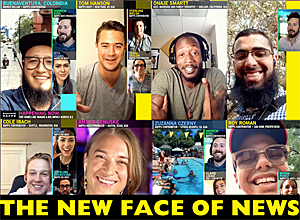


Why You Should Take Citizen Journalists with a Smartphone Very Seriously
[by Howard Fencl, Hennes Communications] There are always raised eyebrows in our media training sessions when we tell participants they are always on the record – that in today’s social media world you’re not only on the record with reporters, you’re on the record whenever you talk about your company at the grocery store, on your way into church, at a sporting event or anywhere in the community. Anyone with a smartphone can be a citizen journalist, quickly sharing tweets, Facebook posts, photos or videos of you at any time. Words you wish you had not said can quickly go viral and sink you in a reputation quagmire.
Now, David Neuman, the former CNN Chief Programming Officer who launched Anderson Cooper’s career, has teamed up with digital news veterans and cutting-edge technologists to create happs.tv, an online news network that brings together citizen and seasoned journalists to cover breaking news anywhere it happens, at any time it happens.
I ran TV newsrooms for 20 years. I jumped out of the business for 16 years. When I got back into “the biz” from 2007-2012, I was shocked to find that other than the technology, not much had changed. But Happs has the potential to set the tired TV news paradigm on its head. Instead of top down reporting, Happs presents news from the bottom up.
This is not a rag-tag collection of reporter wannabees stumbling through smartphone live shots. This is news delivered straight to you, capturing protesters demanding Puerto Rico’s governor resign, witnessing a toy factory rocket attack in Israel, chronicling the transit of Mercury, and documenting the Trump impeachment hearings, all raw and live. Does the reporting look amateur? You bet. You forgive that because the reporting propels you smack into the middle of the action, unfiltered by network news executives, their slick consultants or their advertisers.
“Today is tense. Economically. Socially. Politically,” a Happs News video declares. “The media makes things worse, fueling frictions and deepening divisions. But this is where you come in with live, experiential journalism…this is the future of news.”
The reporting is organized in a daily virtual editorial meeting – much like the daily morning meetings at TV stations and newspapers – but they’re conducted on Zoom. If you sign up to contribute, you have to pitch your story to a Happs executive producer who has earned her stripes in traditional and digital news media. If your story gets the go-ahead, you work with a producer or other veteran journalists to get through your live report. Contributors communicate and work together using the Slack app.
Contributor guidelines set ethical ground rules: “Happs strives to maintain journalistic integrity in everything we create. That means that everyone who participates with Happs…is obligated to tell the truth.”
And if you have bias? “We insist that you be transparent about your bias so that the audience can understand where you are coming from…and you still have an obligation to tell the truth.”
Happs’ website is still in development – your best bet to sample the network is on its Twitter feed, @HappsNews. Some of the reporting is compelling – a Hong Kong live contributor getting sprayed by riot police with a blue dye cannon. Some of the reporting is surreal – an Asbury Park drag performer covering the impeachment hearings.
But make no mistake – although Happs is a nascent news enterprise, it signals the start of a new direction for journalism. The term “citizen journalist” has been around since at least the late 1980s, when the public or civic journalism movement began amid declining trust in the news media. In the decades since, citizen journalism has been celebrated as the true democratization of information sharing and decried as an amateur substitute for the veteran reporters laid off by financially struggling news organizations.
Happs is something else. It is citizen journalism on steroids and it makes the notion that anyone with a smartphone is a reporter more true than ever. And anyone on the other end of that smartphone must take that seriously. Because now, you truly are always on the record.